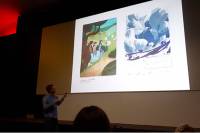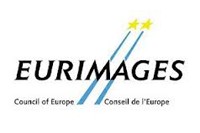WARSAW: The Warsaw Industry Days, an industry event held at Warsaw Film Festival, showcased 10 upcoming projects including international coproductions and new films from Emir Baigazin, Mateusz Rakowicz and Maryna Vroda.
WARSAW: Four Polish projects currently in production and postproduction were showcased during the Warsaw Industry Days, an industry event held at the Warsaw Film Festival (13-22 October 2017). The list includes new projects by Ewa Bukowska, Maciek Bochniak, Klara Kochańska and Kasper Bajon, and Bartek Kik.
FNE at Forum Regiofund 2017: Producer Joanna Malicka Heads Young Producer Workshops
Poland 13-10-2017KATOWICE: FNE spoke with film producer and academic teacher from the Wajda School and the Faculty of Radio and Television Joanna Malicka who provided the "Young Producer Workshops" during the International Co-Production Forum Regiofund, that took place in Katowice from 4 to 7 October 2017.
Summary from Variety correspondent Nick Vivarelli
A group of 50 prominent European independent film industry execs assembled Thursday for the Locarno Festival’s StepIn think tank to discuss the timely topic of “The Theatrical Experience and the Future of Auteur Cinema in the Age of Global Streaming Platforms and Social Networks.”
Judging from the attendees reaction, it was a huge success: "We are extremely proud of the high-level of participants and the quality of the discussion - states Nadia Dresti, Deputy Artistic Director of the festival - Our best reward is to hear industry professionals praising how useful and thought-provoking was for them to participate to these round tables. This is our ultimate goal: if we were able to inspire productive conversations and facilitate solutions and networking opportunities, it means we have done our job well."
Following the recent controversy in Cannes over Netflix’s stringent theatrical release policy, Locarno’s StepIn think tank provided a forum to take the discussion to a more constructive level.
“Every once in a while there is someone who mourns the end of the theatrical experience,” said StepIn project manager Marcello Paolillo, in his introduction. “But while researching for this event I realised that, even though we are going through a challenging period, with seismic changes in the industry, the question is not if the theatrical experience will survive, but how it will evolve."
During the opening keynote Tim League, who is CEO of the Alamo Drafthouse Cinema chain in the U.S. which operates some of the best movie theatres in the world, offered his perspective that, at least in the United States, the erosion of theatrical “is probably good in the long run” because it is forcing exhibition chains to re-invest to upgrade movie theatres so they can offer a top notch moviegoing experience.
Focus Features President Robert Walak, another keynote speaker, noted that one of the first films they greenlit under the new Focus, Sofia Coppola’s “The Beguiled,” was specifically conceived for theatrical in “The way it was shot; the way it was set up, it was just a cinematic experience. And that is our strength in terms of what we do at Focus.”
Bobby Allen, VP of Content at MUBI, the curated streaming platform available in more than 200 territories, which last year branched into theatrical distribution, also underlined that auteur cinema is “made to be seen on the big screen.” “The most important thing to us is to ensure these films have a life beyond the digital platform,” he noted.
After the keynote, participants were divided in round tables for a long session on specific topics.
During the wrap-up League’s point about the crucial need for movie theatre quality to be improved was picked up on by Marc Allenby, the CEO of the UK’s Trafalgar Releasing, who was one of the designated notetakers. Allenby pointed out that, similarly to the U.S., in Europe “Some operators have become lazy and exhibitors have abandoned their biggest asset - their relationship with their customers.”
TrustNordisk head of sales Susan Wendt, also a note taker, pointed out that several European sales agents don't think Netflix should be allowed to put their films in competition at A-list film festivals. “As sales agents, we need those competition slots in order to sell our movies and put them in movie theatres. Why have a film in the competition that does not need that? The fact that when Netflix buys art movies in Europe they try to limit that film’s festival exposure was also bemoaned “Because this is a cultural loss for the public and also for the filmmaker,” said another note taker, Mexican producer Jaime Romandia.
StepIn was organized In partnership with Variety, in collaboration with Europa Cinemas, Europa Distribution and Europa International, and with the support of the Federal Office of Culture of Switzerland in the context of the compensatory measures Media.
An exceptional research project presents Laterna magika, the first multimedia theatre in the world
Press releases 11-08-2017The National Film Archive based in Prague, Czech Republic has launched the website laterna-research.com, the first result of the extensive research project Laterna magika* looking to preserve, document and present this phenomenon of world significance to the international public.
Why research Laterna magika?
Laterna magika is the first multimedia theatre in the world. Due to its experimental character, combination of film projection, movement of dancers and original scenography, interconnection of art and development of new technologies (primarily projection ones), and collaboration between numerous personalities, it has become an exceptional cultural phenomenon in the context of Czech and world art.
It was established as a representative cultural and promotional programme of Czechoslovakia for the international exhibition Expo 58 where it met with enormous interest of the audiences and won the Gold Medal along with other period art projects. The combination of a multi-genre theatre performance and film projection onto several screens placed on the stage garnered unprecedented acclaim: “All the theatres presented in the individual pavilions at Expo were hit by a real bomb and blown to pieces. The bomb came flying from Prague. Last night, Czechoslovakia opened its cultural hall and introduced a theatre unique for its originality. We saw circoramas and other cineramas, Kinopanoramas, Kongoramas etc. We believed that we had reached the top, that the seventh art had revealed all its secrets; until we saw the non-stop-revue, or Laterna magika,” wrote Brussels’ Drapeau Rouge journal on May 13, 1958.
Thanks to its great international acclaim, the unique project travelled to other countries in and outside of Europe, where it became popular both with audiences and period critics. The new artistic possibilities of communication between the film medium, the theatre stage and the dancers were most embodied in the invention of a new type of projection system called the polyecran; which, for the first time ever, presented a simultaneous projection controlled by a set of film projectors and slides, conducted on several projection surfaces and accompanied by multi-channel sound.
A period edition of Variety wrote about Laterna magika’s American tour: “We had to travel behind the Iron Curtain to discover a completely new kind of scenic film design, practically unknown to Americans... Laterna magika is not only a technological innovation but also a form that gives the creative artist a new way of expression, a new language. In its idiom, statistics meet poetry, static images, live actors and reproduced music. The new poetic force of this expression is based on its ability to view reality from several perspectives, from several time levels, and to combine facts that are in fact unrelated. Laterna magika is able to show the modern world in all its dynamic force and in all mutually connected relations.” (Howard Pearl, July 17, 1963)
When touring the North American continent, the theatre also met with great success in Canada; during the international cultural showcase Expo 67, exactly 50 years ago, it staged a performance where the unique polyecran projection system played the main role.
In the second half of the 20th century, the theatre gradually became an internationally acclaimed artistic brand whose quality and innovation were appreciated over decades of successful world tours by viewers in the United Kingdom, where British dramatist Wolf Mankowitz labelled it as “the most revolutionary technology in entertainment since the introduction of cinema,” in the Netherlands, USSR, France, Austria, Spain as well as Syria, Egypt and Israel. The very first programme, whose earliest performance Wonderful Circus is still staged today and has celebrated its 40th anniversary since its launch this year, was a joint collaboration of directors Emil and Alfréd Radoks and scenographer Josef Svoboda, who were later joined by directors Ján Roháč, Vladimír Svitáček, Ladislav Rychman, Miloš Forman as well as other distinguished film and music makers including Evald Schorm, Jan Švankmajer, Radúz Činčera, Jiří Šlitr and Zdeněk Liška.
What are the components of the Laterna magika research project?
The research project Laterna Magika. Past and Present, Documentation, Preservation and Presentation represents an interdisciplinary challenge combining historical research, preservation and digitization of film material, construction of a new archive infrastructure and creation of experimental multimedia data. In the field of historical research, it includes collecting archives from private and public collections and extensive interviews with more than 70 contemporaries of various professions. The special processing of film footage capturing the individual theatre performances as well as film screenings and technological tests includes primarily the preservation, description and digitization of those parts of the film heritage that were selected by curators after being handed over to the National Film Archive by the National Theatre in 2010.
The historical and cinematic research fields are supplemented with the creation of new multimedia data consisting primarily of experimental recording and animation of the movement of the dancers and 3D visualizations of the stage of Laterna magika performances. The multidisciplinary character of Laterna magika’s work is also reflected in the composition of the research team comprising experts in humanities as well as technical disciplines. Four academic and technological institutions collaborate on the successful execution of the research conducted between 2016 and 2019: the National Film Archive in Prague, the Faculty of Arts of Charles University in Prague, Czech Technical University in Prague and CESNET association.
What is the goal of the research project?
The main goal of the project is to save and preserve historical and film data, supplemented with new multimedia data, in a safe online archive environment and take care of these on a long-term basis in terms of data preservation as well as by curating the collection that has thus arisen.
The first results of the project, consisting of interviews with contemporaries, a sample of archive materials and interviews with the members of the research team, are now available in English at www.laterna-research.com.
The second key goal of the project consists in preparing an exhibition which will present the interpretation of Laterna magika as a multimedia audiovisual work to the general public and bring its digitized elements into lively communication with the language of contemporary visual artists. The exhibition, to be held in Brno in the spring of 2019 and in Prague in the fall of the same year, will be accompanied by a detailed monograph in the Czech and English language. We are also negotiating its international reruns.
Last but not least, the research team focuses on publishing expert studies in professional periodicals and establishing active collaboration with leading international partners and research institutions.
For more information, please, see the project’s website: http://www.laterna-research.com.
The research is funded by the Applied Research and Development of National and Cultural Identity (NAKI II) programme of the Ministry of Culture of the Czech Republic.
Contact
Professional inquiries:
Andrea Průchová
Head of the project NAKI II Laterna magika
Národní filmový archiv
Malešická 12
130 00 Praha 3
T: +420 737 804 449
E: This email address is being protected from spambots. You need JavaScript enabled to view it.
Press materials:
Jana Ulipová
PR Manager
Národní filmový archiv
Malešická 12
130 00 Praha 3
T: +420 778 522 709
E: This email address is being protected from spambots. You need JavaScript enabled to view it.
TIDF is looking for documentaries that are most creative, closely connected to social and human interests, and have unique points of view!
The 11th TIDF will take place on May 4-13, 2018.
Three major competitions with 11 awards and more than US$70,000 total cash-prize await. The entry deadline is December 8, 2017.
Filmmakers are encouraged to submit documentaries completed after December 1, 2015. All forms and lengths are welcome. No entry fee. A Taiwan Premiere is required, except for Taiwan films.
Find out more information in the Entry Regulations.
Films in the Main Competition and the Visions Apart Competition of the 42nd Polish Film Festival in Gdyni
Festivals 28-07-2017We know the selection results for the Main Competition and the Visions Apart Competition of the 42nd Polish Film Festival in Gdynia.
Seventeen films have been qualified for the Main Competition of the 42nd PFF. They will compete over the Golden Lions and other statutory and non-statutory awards. More than in previous years – as many as eight films – have been included in the Visions Apart Competition.
In the common understanding, prevalent until now, the Visions Apart section included films that were experimental, formally different, often “gallery-type”, with focus on diversity and novelty of form. We decided to widen this formula, Wojciech Marczewski, the Chairman of the Programme Council of the Festival says. The very concept of “Visions Apart” involves an individual, different from the commonly accepted point of view of the author on complex, multi-faceted reality. Sometimes, it leads to breaking the recognised genre norms; sometimes, to an extremely personal description of the world; sometimes, it unites them into a new, discovery whole. The searching make deep sense and sometimes it leads to new paths in art and in the perception of reality. The change the habits of viewers, they become inspiration for other makers.
We would wish for this section (similarly as Un Certain Regard in Cannes) to constitute a wide spectrum of formally and thematically interesting new film proposals. This is why we allow ourselves to present in this year’s set both interesting feature films, experimental films, popular-scientific films, and the acting film for children. This last film genre is unfortunately vanishing, and it is extremely necessary for our cinema. It is worth supporting it,! Wojciech Marczewski emphasises. Films in the Visions Apart competition fight over the Golden Claw Award.
In the Main Competition, there are eight full-length directing debuts and two second films of the makers. In Visions Apart – three debuts and two second films. Twelve films from the Main Competition and six from Visions Apart will be presented as their Polish premiere screenings at the Gdynia Festival.
We present the results of the Festival selection.
THE MAIN COMPETITION OF THE 42ND POLISH FILM FESTIVAL:
·“Amok”, directed by: Katarzyna Adamik
·“Panick Attack”, directed by: Paweł Maślona (debut, premiere)
·“Catalina”, directed by: Denijal Hasanović (debut,premiere)
·“Silent Night”, directed by: Piotr Domalewski (debut, premiere)
·“The Man with the Magic Box”, directed by: Bodo Kox (second film, premiere)
·“Be Prepared”, directed by: Robert Gliński (premiere)
·“The Best”, directed by: Łukasz Palkowski (premiere)
·“Spoor”, directed by: Agnieszka Holland
·“Beyond Words”, directed by: Urszula Antoniak (premiere)
·“Birds are Singing in Kigali”, directed by: Joanna Kos-Krauze, Krzysztof Krauze (premiere)
·“Chain Reaction”, directed by: Jakub Pączek (debut, premiere)
·“The Art of Loving. The Story of Michalina Wislocka”, directed by: Maria Sadowska (drugi film)
·“Loving Vincent”, directed by: Dorota Kobiela (debut, premiere)
·“Volta”, directed by: Juliusz Machulski
·“Tower. A Bright Day”, directed by: Jagoda Szelc (debut, premiere)
·“The Damned One”, directed by: Konrad Łęcki (debut)
·“The Reconciliation”, directed by: Maciej Sobieszczański (debut, premiere)
THE VISIONS APART COMPETITION OF THE 42ND POLISH FILM FESTIVAL:
· “Wild Roses”, directed by: Anna Jadowska (premiere)
· “A Hole in the Head”, directed by: Piotr Subbotko (debut, premiere)
· "The Invisibles", directed by: Paweł Sala (second film, premiere)
· “Photon”, directed by: Norman Leto (second film, premiere)
· “Szatan kazał tańczyć”, directed by: Katarzyna Rosłaniec
· “Double Trouble”, directed by: Marta Karwowska (debut)
· “Theatrum Magicum”, directed by: Marcin Giżycki (premiere)
· “TodMachine”, directed by: Bogusław Kornaś (debut, premiere)
The 42nd Polish Film Festival in Gdynia will be held from 18th to 23rd September 2017.
The sale of Festival accreditation is ongoing on the website (click)
More about the competition films: Main Competition (click) and Visions Apart Competition (click)
 Click to open image!
Click to open image!
Click to open image!
Click to open image!
 Click to open image!
Click to open image!
Click to open image!
Click to open image!
 Click to open image!
Click to open image!
Click to open image!
Click to open image!
 Click to open image!
Click to open image!
Click to open image!
Click to open image!
 Click to open image!
Click to open image!
Click to open image!
Click to open image!
 Click to open image!
Click to open image!
Click to open image!
Click to open image!
 Click to open image!
Click to open image!
Click to open image!
Click to open image!
 Click to open image!
Click to open image!
Click to open image!
Click to open image!
 Click to open image!
Click to open image!
Click to open image!
Click to open image!
 Click to open image!
Click to open image!
Click to open image!
Click to open image!
 Click to open image!
Click to open image!
Click to open image!
Click to open image!
 Click to open image!
Click to open image!
Click to open image!
Click to open image!
 Click to open image!
Click to open image!
Click to open image!
Click to open image!
 Click to open image!
Click to open image!
Click to open image!
Click to open image!
 Click to open image!
Click to open image!
Click to open image!
Click to open image!
 Click to open image!
Click to open image!
Click to open image!
Click to open image!
 Click to open image!
Click to open image!
Click to open image!
Click to open image!
 Click to open image!
Click to open image!
Click to open image!
Click to open image!
 Click to open image!
Click to open image!
Click to open image!
Click to open image!
 Click to open image!
Click to open image!
Click to open image!
Click to open image!
https://filmneweurope.com/blog/itemlist/user/548-annashevchenko?start=300#sigProIdf6fb1335d4
-
 Click to open image!
Click to open image!
Click to open image!
Click to open image!
-
 Click to open image!
Click to open image!
Click to open image!
Click to open image!
-
 Click to open image!
Click to open image!
Click to open image!
Click to open image!
-
 Click to open image!
Click to open image!
Click to open image!
Click to open image!
-
 Click to open image!
Click to open image!
Click to open image!
Click to open image!
-
 Click to open image!
Click to open image!
Click to open image!
Click to open image!
-
 Click to open image!
Click to open image!
Click to open image!
Click to open image!
-
 Click to open image!
Click to open image!
Click to open image!
Click to open image!
-
 Click to open image!
Click to open image!
Click to open image!
Click to open image!
-
 Click to open image!
Click to open image!
Click to open image!
Click to open image!
-
 Click to open image!
Click to open image!
Click to open image!
Click to open image!
-
 Click to open image!
Click to open image!
Click to open image!
Click to open image!
-
 Click to open image!
Click to open image!
Click to open image!
Click to open image!
-
 Click to open image!
Click to open image!
Click to open image!
Click to open image!
-
 Click to open image!
Click to open image!
Click to open image!
Click to open image!
-
 Click to open image!
Click to open image!
Click to open image!
Click to open image!
-
 Click to open image!
Click to open image!
Click to open image!
Click to open image!
-
 Click to open image!
Click to open image!
Click to open image!
Click to open image!
-
 Click to open image!
Click to open image!
Click to open image!
Click to open image!
-
 Click to open image!
Click to open image!
Click to open image!
Click to open image!
https://filmneweurope.com/blog/itemlist/user/548-annashevchenko?start=300#sigProId2ab679517a
VILNIUS: The Eurimages Fund has announced support of 20 films following its 15-17 October 2013 meeting held in Vilnius. The films, including features, animation and documentaries, will share a total of 6.1m EUR.























